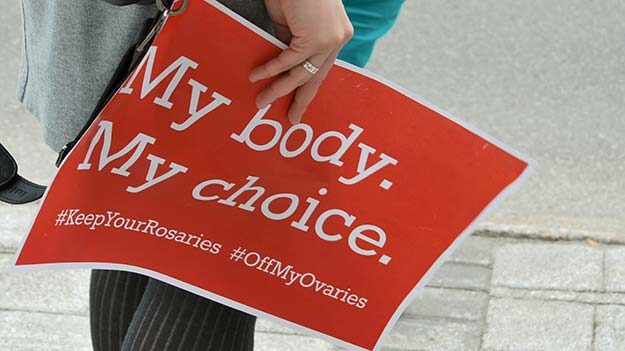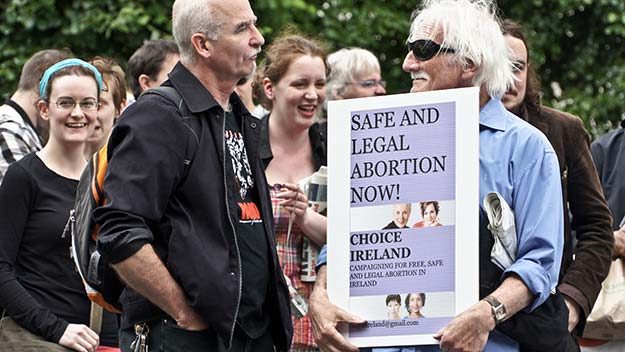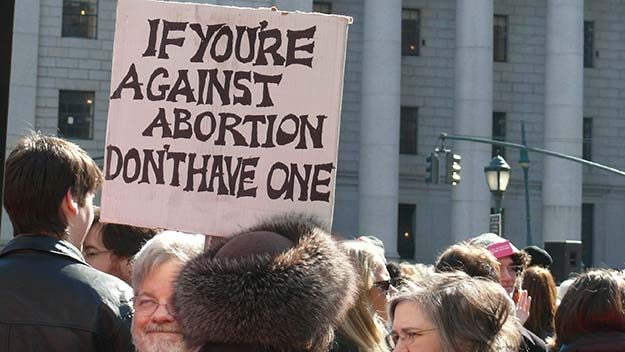“My body, my choice” is a common refrain for abortion rights activists. In Northern Ireland, women are campaigning for the right to make decisions about their bodies.

Hundreds of women marched through Belfast on 9 March 2019, demanding changes be made to existing laws that ban abortions in Northern Ireland.
The debate over access to abortions in Northern Ireland has become increasingly heated since the Republic of Ireland voted to repeal the country’s ban on abortion in May 2018.
Northern Ireland: UN says abortion laws violate human rights of women and calls on UK Government to legislate https://t.co/995lG8mi1N pic.twitter.com/sR5oihdSP1
— Amnesty Int'l NI (@AmnestyNI) March 11, 2019
With Ireland’s referendum, Northern Ireland became the only place in Britain and Ireland where women do not have easy access to abortion.
“Women are being disadvantaged and discriminated against because they have to travel for healthcare, when healthcare should be provided in Northern Ireland,” said Anne McVickar, the chair for Reclaim the Agenda, a collective of women’s groups and activists.
Scotland, Wales and England all allow abortion before 24 weeks, with consideration for circumstances, under the Abortion Act of 1967.

(function (d) { var js, id = “genially-embed-js”, ref = d.getElementsByTagName(“script”)[0]; if (d.getElementById(id)) { return; } js = d.createElement(“script”); js.id = id; js.async = true; js.src = “https://view.genial.ly/static/embed/embed.js”; ref.parentNode.insertBefore(js, ref); }(document));
Under the Abortion Act, women wishing to apply for an abortion must have consent from two registered doctors that a continuation of the pregnancy would involve significant risk to her or her child, or any already existing children, prior to obtaining the abortion.
In Northern Ireland, however, abortions are considered illegal with very few concessions. Women wishing to have an abortion must travel either to England, Scotland, Wales or Ireland.
“It is even harder for women to access abortions here in Northern Ireland if you have risk to your mental health or a risk to your life,” said Helen Crickard, coordinator for Reclaim the Agenda.
In 2015, the High Court in Belfast ruled the ban was incompatible with the European Convention on Human Rights, but no legal actions were made to address the law.
There’s an undertone to all of this of not trusting women. We’re not trusted to make our own decisions. We’re not trusted to know about our own bodies. We’re not trusted. #trustwomen
— RatherBeHome (@HomeRather) October 21, 2018
Thousands have signed petitions calling for the decriminalisation of abortion in Northern Ireland, some of which were delivered to the secretary of Northern Ireland in February 2019 by women who marched across Westminster Bridge carrying suitcases.
“We have moved the conversation in the last 10 years working collectively as a women’s movement to talk about reproductive health care, to talk about abortion [openly],” said Crickard.

Many women present at both the February and March events believe they will not be seen as equals until healthcare issues such as abortion rights are addressed equally in their own country.
While the NHS offered to pay for travel expenses incurred by women who travelled from Northern Ireland to have abortions, some argue it only strengthens the disparity between those who can afford abortions and those who need it.
“So what they’re [Westminster and the local government] saying is yes it’s ok to have an abortion but not in our jurisdiction, so we have to travel,” said Crickard. “It highlights how much the situation has been used as a political tool rather than actually as women’s health as the sole purpose.”
A study by the Guttmacher Institute shows that the majority of women accessing abortions tend to come from lower-income brackets, and often already have children at home.
Women from lower-income backgrounds often lack basic access to reproductive care, such as birth control and regular health checks, increasing their risk of unwanted pregnancies.
Girls don’t get a ‘potential risks and side effects of #pregnancy’ leaflet or instructional video when they get their first period. Once you’re ‘with child’ you just have to accept all the things that you didn’t know you were risking and a total lack of control @HackneyDoula
— RatherBeHome (@HomeRather) October 19, 2018
With tight restrictions on abortions, women may feel compelled to seek out ‘back-alley abortions’ that are often offered by unregistered medical professionals and lack basic health safety. These types of abortions carry the risks of infection, irrevocable damage to a woman’s uterus and an increased chance of death from complications.
Advocates for abortion (pro-choice) believe that lifting restrictions will allow more women to access preventative birth control, decreasing the demand for abortions.
Anti-abortion advocates (pro-life) argue differently, believing that the sanctity of human life should be upheld as much as possible and that abortion inherently prevents that.
Please join us in our urgent ‘Lent for LIFE’ campaign – 40 days of prayer and fasting to END ABORTION!
Every day our volunteers from all over Northern Ireland travel to stand outside an abortion referral centre in Belfast – contact us on 028 9027 8484 to help them out this Lent. pic.twitter.com/rQgfRcBMTV
— Precious Life (@PreciousLifeCom) March 12, 2019
The Society for the Protection of Unborn Children (SPUC) is a pro-life organisation that campaigns for fetal rights.
“We believe that every human life is entitled to the most basic human rights regardless of their sex or abilities,” said Grace Browne, the communications and campaigns assistant for SPUC Scotland.
In addition to campaigning for stricter restrictions and the repeal of the Abortion Act, SPUC organises workshops and attends public events to educate the public on their stance.
Organisations like Alliance for Choice, however, disagree. An abortion rights advocacy group based in Northern Ireland, Alliance for Choice campaigns for the right of women to access safe and legal abortions.
https://twitter.com/MarieStopesUK/status/1104010150308990976
Reclaim the Agenda and Alliance for Choice do note that there are positive developments. At events like their rallies as well as informational stands, they feel that the conversation surrounding abortion is shifting.
“A lot of people come up and say, ‘You know, I don’t agree with it but you know what I think women should be allowed to access it here,’” said Crickard. “So things on the ground have definitely moved much more forward.”

